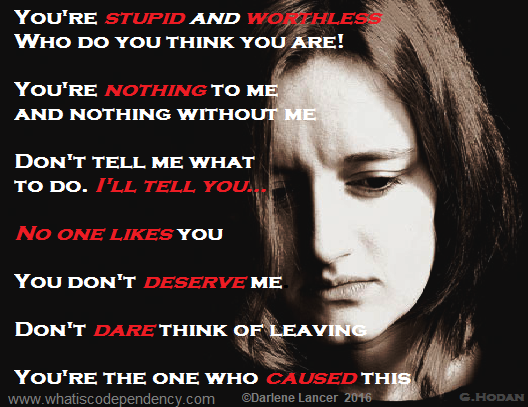Self-Esteem
How to Change the Dynamics of an Abusive Relationship
Don't allow yourself to be manipulated to support abuse. Learn what you can do.
Posted June 1, 2020 Reviewed by Kaja Perina

Partners in abusive relationships undergo ongoing trauma. These relationships can seriously undermine our self-esteem, but some people come to them with low self-esteem already, due to trauma or dysfunctional parenting in their childhood. They believe that they’re somehow inferior and that what they feel, think, need, and/or want is less important than what others do. This is their hidden shame.
As a result, they hold an unconscious belief that they don’t truly deserve to be loved simply for who they are, but that they have to earn love. This causes basic insecurity and fear of being abandoned.
How Partners Get Seduced
Because their mates are often charismatic and romantic, they can be seductive and shower their partner with compliments, promises, and gestures of love. They are skilled at playing games and may even "love-bomb" them. Their partners yearn for love and connection, and being desired makes them feel lovable. But insecurity and low self-esteem make them susceptible to seduction so that they confuse romance with real love. Insecurity also makes them fearful of criticism, rejection, and abandonment, which they cope with by being giving, understanding, pleasing, and by being helpful. Some believe they must be kind, even while being exploited and abused.
Thus, the abuser defines the relationship, while their partners go along to get along and maintain it. They admire some abusers' boldness, conviction, and perceived strength (qualities they themselves lack) and enjoy a supportive role and feel taken care of. With other types of abusers, they’re often in the role of helper and nurturer. Being needed feels like love. It boosts their self-esteem and assures them that they won’t ever be abandoned.
However, abusers have deep shame. They project their inner demons onto the very individual who loves them and is trying to help them.
Coping With Abuse
Abuse and withholding love put partners in a reactive role, focusing on their mate, walking on eggshells, and hiding who they are. They increasingly try to control the uncontrollable, sacrifice themselves, and try harder to please and be accepted. Although at first, they were idealized, now they’re devalued.
Some abusers vacillate between idealizing-caring behavior and devaluing-rejecting behavior. Instead of acting needy, other abusers act either demandingly needy or needless. They're callous and can be remote and emotionally cold. Some may show friendliness toward their partner, while others are continually critical and contemptuous.
The more that love is withheld or inconsistent, the more partners try to win it, falling into the trap of turning over their self-esteem and sense of well-being to their mate. Their mind becomes subservient to the abuser's brain. They never feel good enough, reinforcing their hidden shame.
This unspoken contract works for a while because partners provide safety and stability and a missing warmth and connection. But due to their own insecurity and weak boundaries, partners absorb the blame, guilt, and shame dished out by abusers. They feel powerless to help and satisfy their partner, guilty for “mistakes” they’re accused of, and resentful that their efforts are unappreciated and fail. Abusers control their partners with their aggression and projection. As the relationship deteriorates, so does the partner’s sense of self.
The dynamics in abusive relationships heighten partners’ stress and escalate their attempts to appease and help their mate. Over time, the reality of the addict or personality disordered individual starts to infect the partner's self-concept and perceptions of reality, also. Their self-esteem is lowered, and they become more anxious and drained trying to abate a crisis, avoid abuse, and hold the relationship together.
While trying to adapt to someone else so that they can feel better, partners move away from real solutions. They hold a misguided belief that they’re responsible for the abuser’s feelings and needs while ignoring their own. The abuser's aggressive and manipulative behavior reinforces their partner’s false belief that they’re at fault and are responsible for the abuser's addiction and pain.
The longer partners do this, the worse things get. They deny their own pain and prevent the abuser from taking responsibility for their behavior, needs, and feelings and from getting help. This is called “enabling.” Moreover, denial blinds them to the fact that their beliefs and behavior contribute to their unhappiness and that they have options to change.
Changing the Dynamics in Abusive Relationships
The answer is doing the complete opposite of what comes naturally to victims of abuse. I write from both my personal and professional experience.
1. Get Support
First and foremost is not to isolate. It is hard—really impossible—to change the dynamics in abusive relationships without outside support. Get support to see another view of reality, because partners become isolated and confused by the attacks, threats, and skewed reality of the abuser.
2. Focus on Your Recovery
Change doesn’t really begin until partners focus on their own recovery, not in changing the other person, over whom they’re essentially powerless. That doesn’t mean that they don’t have any power or choices, but it’s over their own actions and lives.
3. Learn and Accept
It’s important to learn all you can about abuse. Learning about it and accepting the truth at a deep level enables you to come out of denial.
4. Detach
Detaching doesn’t require leaving or being aloof. It’s like having an invisible, protective force field. Instead of reacting, you detach and do not react to what someone else decides to throw at you just because they’re uncomfortable in their own skin. You begin to realize that although their words may hurt, they’re not true.
5. Meet Your Needs
You learn to honor what you need, feel, and want. You meet those needs from people who are safe and supportive. This will grow your self-esteem. You no longer think like a victim and become empowered.
6. Become Assertive
As your self-worth grows, you learn to be assertive. Your boundaries improve, and you ask for what you want and set limits on what you don’t. This isn’t easy, but your courage grows in recovery. You might get strong enough to leave or insist that your partner get treatment.
Even if you stay in the relationship, you discover that your life is happier, because you’ve taken charge of your own self-esteem and sense of well-being.
© 2019 Darlene Lancer
References
Outside support is essential. Seek psychotherapy and Twelve-Step meetings, such as CoDA or Al-Anon. If addiction is involved, find an appropriate meeting for relatives of substance abusers.
If you’re dealing with someone highly defensive or narcissistic, learn more about these relationships, and follow the steps in Dealing with a Narcissist. It will also help you decide whether to stay or go.




